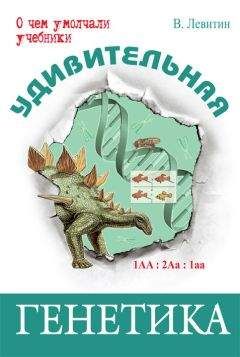Владимир Эфроимсон - Генетика этики и эстетики
1428. Loehlin J.C., Lindzey G., SpuhlerJ.N. Race difference in intelligence. San
Francisco, Freeman, 1975. Loewenfeld L. Uber die geniale Geistesthatigkeit mit besonderer Berucksichtigung des
Genies fur bildende Kunst. Wiesbaden, Bergmann, 1903, 1-104. Levasseur P. E. L'instruction primaire aux Etats-Unis. Paris, 1894. 1-108. Lorenz K. Das sogennante Bose. Zur Naturgeschichte der Aggression. Wien, Borother-
Schoeler, 1963, XV, 1-415.
Lorenz K. On Aggression. N. Y., Bantam Books, 1969, 1-306. Lo у о t P. La goutte chez le due de Lorraine. Semaine des Hopitaux. Paris, 1953, 23, N 5,
1280-1289.
Ludwig E. Genie und Charakter. В., Zsolnay, 1932, 1-457. Lu dwig E . Beethoven. Life of a conqueror. L., Hutchinson, 1943, 1-271. Luke M.M. Gloriana. L., Gollancz, 1974, 1-734. Macaulay T. B. Critical & historical essays. L.-N. Y., Dent & Dutton, 1961, v. 1, 1-669;
v. 2, 1-669.
McGrow. The Modern men of science. N. Y., McGrow-Hill, 1966, 1- 620. Madariaga S. de. Christopher Columbus. N. Y., Ungar, 1967, 1-524. Madelin L. Les grands serviteurs de la monarchie. P., Flammarion, 1933, 1-126. Manfredi E. et al. Etude clinique (oculaire, cardiovasculaire (constitutionelle) et
genetique du syndrome de Marfan (Enquete sur 12 families). J. Genetique Humaine,
1977, 25, Suppl. 1-65. Mark V., Erwin F. R. Violence and the Brain. N. Y., Harper & Row, 1970, XIV,
1-170.
Martin R . G . Lady Randolf Churchill. L., Cassel, v. 1, X, 1-335, v. 2, XI, 1-384. Marx K. The secret diplomacy of the XVIII century. L., Sonnenschein, 1899, 1-96. Maurier D, de. Golden Lads. N. Y., Doubleday, 1975, 1-251.
Maynard E.C.L. Cleaning symbiosis and oral grooming on the coral reef. Biology of
the Month. Washington, 1968, 79-88.
Maynard-Smith J. Group selection. Q. Rev. Biol. 1976, 57, 277-283. Men and mice at Edinburgh. Reports from the Genetic congress. The «Manifesto».
J. Heredity, 1939, 30, N 9, 371-374. Mess F. Das geistige Reich von dieser Welt. Berlin, Verlag fur Staatswissenschaften, 1935,
1-78. M e s t e 1 A. Das physiologisch geistige Leistungsmaximum in Lebensalter. Munchen, Frank,
1967, 1-83.
Mitchell M. Gone with the wind. N. Y., MacMillan, 1948, 1-1037. Mobi us P . J . Uber das Pathologische bei Goethe. Leipzig, Barth, 1898, 1-208. Mobius P. J. Schopenhauer. Leipzig, Barth, 1904, 1-282. Monroe R. R. Anticonvulsiants in the treatment of aggression. J. Nerv. ment. Dis., 1975,
160, N2, 119-126.
Montegue A. (Ed.). Man and Aggression. N. Y., Oxford Univ. Press, 1968, 1-178. Montegue A. The nature of human aggression. L., Oxford Univ. Press, 1976, XI, 1-381. Moran C. W. Churchill. Boston, Houghton, Mifflin, 1966, 1-877. Morris D . The biology of art. London, Methuen, 1962, 1-176.
Morris D . The naked ape. A zoologist's study of the human animal. N. Y., 1967, 1-252. Moscheroesch H.M. Der nutzliche Gebrauch des adeligen Podagras mil alien dabei
befindlichen Tugenden desselben. 1739. Moyer К. Е. Physiology of aggression and implications for control. Personality and
psychopatology. N. Y.-L., Academic Press, 1971, 1-171, 61-92. Mueller E. F. & Brooks. Harnsaure undEifolgsstreben. Bild derWissenschaft, 1967,
4, N 5, 402-408. Napoleon. Vie politique et militaire de Napoleon, raconte par lui-meme au Tribunal de
Cesar, d'Alexander et de Frederic. Paris, 1827, v. IV, p. 16. Newman H.H., Freeman F.N., Holzinger К. J . Twins. A study of heredity
and environment. Chicago Univ. Press, 1937, 1-360. N i с h о 1 s R. С. The National merit twin study. Methods and Goals in Human Behavior
Genetics. N. Y.-L., Academic Press, 1965, 151-166, 231-244. Nitske W.R., Wilson C.M. Rudolf Diesel. Pioneer of the age of power. Norman,
University Oklahoma Press, 1965, 1-318. О d e n M . H. The fulfillment of promise. 40-year follow-up of the Terman gifted group.
Genetic Psychology Monographs, 1968, 77, 3-94. Orowan E. The origin of man. Nature, 1955, 175, N 4459, 683-684. Paddock J., Genoves S. Violence and behavior: a symposium on the origins of Man's
inhumanity to man. Am. J. Physical Anthropology, 1974, 41, N 1, 1-5. Penfield W., Jasper K. Epilepsy and the Functional Anatomy of the Human Brain.
Boston, 1954. 1-896.
The Physiology of aggression and defeat. N. Y., Plenum, 1971, 1-312. Pickering G. Creative malady. L., Alien & Unwin, 1974, 1-327. Plesse W., Rux D. Biographien bedeutender Biologen. Berlin, «Volk und Wissen»,
1977, 1-384. Post R. H. Possible cases of relaxed selection in civilized populations. Humangenetik,
1971, 13, N4, 253-284.
Procopius Caesariensis. Gotenkrieg, Bd. IV.
Prokop L. Die Chromosomen der Sport-Amazonen. Kosmos, 1972, N 10, 433-446. Puzo M. The godfather. Greenwich (Coun.) Fawcett, 1960, 1-447. Rackwitz E. Die unsere Welt verandern halfen. Berlin, 1971. Radestock P. Genie und Wahnsinn. Breslau, Trewend, 1884, 1-79. Reid E. V. Literary genius and manic-depressive insanity. Medical Record, 1913, 83,
N 6, 245-248. Rensch В. Homo sapiens: from man to demigod. N. Y., Columbia Univ. Press, 1972,
1-228. Revesz G. Talent und Genie. Grundzuge euner Begabungspsychologie. Berlin, Francke,
1952, 1-388. Riddel W. I., Carl K.G. Comparative investigations of the relationship between
cerebral indices and learning abilities. Brain, Behavior, Evolution, 1977, 14, N 6,
385-399.
Riehl A. Fuhrende Denker und Forscher. Leipzig, Quelle & Meyer, 1922., 1-240. R о s e n G. Sir William Temple and the therapeutic use of moxa for gout in England. Bull.
Hist. Med., 1970, 44, N 1, 31-39.
Rowse A. L. The early Churchills. N. Y., Harper, 1956, 1-378. Saitschick R. Denker und Dichter. Zurich, Rascher, 1949, 1-340. Sargent W. The psychology of faith. Brit. J. Psychiatry, 1969, 115, N 522, 505-518. Schevill F. The great elector. Chicago Univ. Press, 1947, 1-442. Schoenfeld M.R. Nicolo Paganini, Musical Magician and Marfan Mutant. JAMA, 2/1,
239, N 1, 40-42.
Schreffler K. Lebensbild des Talentes. Berlin, Nauck, 1948, 1-296. Schwartz H. Abraham Lincoln and the Marfan syndrome. JAMA, 1964, 187, N7,
473-479.
Scott W. S. Jeanne d'Arc. L., Harrap, 1974, 1-239. Seeck O. Geschichte des Untergangs der antiken Welt. Berlin, Siemenroth & Troschel,
1897, v. 1, 1901, v. 2. S e i d 1 i tz W. Allgemeines historisches Portratwerk. Eine Sammlung von 600 Portraten der
beruhmtester Personen aller Volker und Stande seit 1300. Munchen, Kunst &
Wissenschaft, 1884—1888, Bd. I-IV.
Seidel W. Gottfried Wilhelm Leibniz. Leipzig, Urania, 1975, 1-109. Selye H. From dream to discovery. N.Y., McGraw-Hill, 1964, 1-419. Sely e H. Stress without distress. L., Hodden & Stoughton, 1974, 1-171. Seze S., Ryckewaert A. La Goutte. P., Expansion scient. franc., 1960, 1-268. Sheinfeld A. Your heredity and environment. L., Chatto & Windus, 1972, 1-830. Shields J. Monozygotic twins. Brought up apart and brought up together. L., Oxford
Univ. Press, 1962, 1-264. Shuter R. Hereditary and environmental factors in musical ability. Eugen. Rev., 1966,
58, N3, 149-156.
Singh J. Some eminent Indian Scientists. Delhi, 1966, 1-131. Spoerri T. Genie und Krankheit. Eine psychopatologische Untersuchung der Familie
Feuerbach. Basel-N. Y., Karger, 1-136. Stafford R. E. Estimation of the interaction between heredity and environment for musical
aptitude of twins. Human Heredity, 1970, 20, N 3, 356-360. Stern C. Grundlagen der Humangenetik. Jena, Fischer, 1968, 1-754. Struve F. S., Klein D. F., Saraf K. S. Electroencephalographic correlates of
suicid ideation and attempts. Arch. gen. Psychiatry, 1972, 27, N 3, 363-367. Swanson D. W.,. Bohnert P. J., Smith J. A. The Paranoid. Boston, Little &
Brown, 1970, XII, 1-523. Talbot I. H. Gout. N. Y.-L., 1964, 1-261. Terman L.M. et al. Genetic studies of genius. I. Mental and physical traits of a
thousand gifted children. Stanford Univ. Press, 1925, 1-648.
Terman L.M. Genetic studies of genius. 1926-1947, Seconded, 1926—1947, v. I-IV. Terman L.M. Scientists and non-Scientists in a group of 800 gifted.men. Psychological
Monographs, 1954, N 378, v. 68, N 7, 1-44.
Terman L.M.,Oden M.H. The gifted child grows up. Stanford, 1948, 1-443. Thaddeus F. Frederick the Great. N. Y., 1930, 1-330. Thomas H., Thomas D.L. Living biographies of great scientists. N. Y., Garden
City, 1959, 1-314. 'Thomas H., Thomas D.L. Living biographies of famous novelists. N. Y., Garden
City, 1959, 1-305.
•Теуnbee A. Some problems of the Greek history. L., 1969, 1-538. Treue W. Mit den Augen ihrer Leibarzte. Dusseldorf, 1955. Trivers R. L. The evolution of reciprocal altruism. Quaterly Rev. Biol., 1971, 46, N 1,
35-37. Van Valen S. Brainsize and intelligence in man. Amer. J. physical Anthropology, 1974,
40, N3,417-424. Verdun M. Medizinische und gerichtsaztliche Anthropologie. Bericht 8. Tagung Dtsch.
ges. Anthropologie, (1963), 165, 134-136.
Vierordt H. Medizinisches aus der Geschichte. Tubingen, Laupp, 1910, 1-200. Waetzold W. Die Kunst des Portrats. Leipzig, Hirt, 1908. W a! d m a n M. Some English dictators. Waldvogel R. Aug der Fahrte des Genius. (Biologie Beethovens, Goethes, Rembrandts).
Hannover, Hahnsehn, 1925, 1-119.
Wasielewski W.J. Robert Schumann. Leipzig, Breitkopff u. Hartel, 1906, 1-532. Watts C. R., Stockes A. W. The social order of turkeys. Scientific American, 1971,
224, N6, 112-118.
Weigand. Turenne. P., Flammarion, 1929, 1-258. Weininger O. Geschlecht und Charakter. Wien-Leipzig, 1920, 1-599. Westhoff C.F., Bumpass L. The revolution in birth control practices of U. S. Roman
Catholics. Science, 1973, 179, N 4068, 41-44.
Whitehead A. Adventures of ideas. Cambridge, Univ. Press, 1943, 1-392. Wickler W. Die Biologie der Zehn Gebote. Munchen, Piper, 1971, 1-224. Wilde G. J. S. Inheritance of personality traits. Acta Psychol., 1964, 22, 37-51. Wilder J. Sugar metabolism in its relation to criminality. Handbook of correctional
psychology, 1947, 98-129..
W i 11 a r d N. Le genie et la folie en dix-huitieme siecle. P., Press Univ. France, 1963, 1-173. Williams D . Neural factors related to habitual aggression. Brain, 1969, 92, N 3, 503-520. Williams N. Elizabeth, Queen of England. L., Weidenfeld, Nicolson, 1967, 1-388. Williams N. The life and times of Henry VII. L., Weidenfeld, Nicolson, 1973, 1-224. Williams N. All the Queen's Men. N. Y., MacMillan, 1977, 1-272. Witt Stetten de. Gout and Metabolism. Scientific American, 1958, 198, N 6, 73-81. Woods F. A. Mental and moral heredity in Royalty. A statistical study in history and
psychology. N. Y., Holt, 1906, VIII, 1-312. Wussing H. Biographien bedeutender Mathematiker. Berlin, «Volk und Wissen», 1975,
1-533. Wyngaarden J. В., Kelley W. N. Gout and hyperuricemia. N. Y., Grune &
Stratton, 1976, 1-512.
А. А. ЛЮБИЩЕВ (1890—1972). Генетика и этика
Настоящая статья являет собой размышления по поводу статьи В. П. Эфроимсона «Генетика этики», присланной мне автором «на разнос», так как мы, несмотря на очень дружественные отношения, принадлежим к разным лагерям, и Владимир Павлович во всех своих высказываниях всегда оказывался ортодоксальнейшим, можно сказать «густопсовым», дарвинистом. Задачей его работы по письму было попытаться объяснить происхождение этики путем естественного отбора, «показать, почему человек в общем и целом, в своем большинстве и в большинстве поступков, вопреки всякой логике и здравому смыслу, вопреки всему решительно все- таки порядочен». По мнению одного биолога, читавшего рукопись в первом варианте, объяснение этики естественным отбором является «последней надеждой» (для кого?).
Я, конечно, не рассчитывал, что рукопись Эфроимсона меня переубедит, не рассчитывал я также, что и мне удастся его переубедить, и поэтому полагал, что мой «разнос» ограничится указанием на то, что для меня кажется совершенно ошибочным. Но прочтя рукопись, которая еще далека от окончательной формы, я был несказанно удивлен и обрадован, так как в постановке проблемы была обнаружена такая широта, которая у «густопсовых» отсутствует. Для этого приведу заключение, которое дает общий обзор статьи: «Европа прожила Средневековье, черпая этику из непоколебимых религий. Затем эту веру сменила рационализированная и адаптированная религия Реформации. XVIII—XIX вв. человечество прожило верой в разум и прогресс. 1-я мировая война пошатнула эту веру. Человечество обратилось к социализму и коммунизму. Но в последней трети XX в. человечество убедилось в том, что представляет собой социализм национальный, коммунизм мао-цзедуновский, нарушения социалистической законности в СССР в известные периоды нашей жизни.
Место слепой веры в религиозные запреты и догмы, кстати, во многом соответствующие требованиям общечеловеческой этики, начиная хотя бы с десяти заповедей, заняли сначала рационализм, а затем псевдодиалектическое, по существу же софистическое отношение к этике: восторжествовал иезуитский принцип «цель оправдывает средства».
Но, избавившись от религиозных догм и от веры в вождей и руководителей, которые знают все лучше других, все же нелегко жить по смутно ощущаемым законам этики, в условности которых человечество так долго и так упорно убеждали со всех сторон и так наглядно. Слишком долго проповедовались классовость, временность, условность этих законов, их субъективность. Слишком малочисленна прослойка тех, кто, не веря в религию, освободившись от политических догм, стоически готовы жить по тем законам этики, следование которым обходится так дорого. Однако эволюционно-генетический анализ показывает, что человечество с самого начала своего развития проходило жесточайший естественный отбор на закрепление тех инстинктов и эмоций, которые мы называем альтруистическими и этическими, что оно проходило жестокий отбор на становление общечеловеческого чувства справедливости, что этот естественный отбор связал все человечество единым органом — совестью. Нельзя это чувство трактовать как следствие давних пережитков религиозного воспитания, как результат массового подавления индивидуальных стремлений к борьбе за свое место в жизни, нельзя это чувство рассматривать как признак слабости, неполноценности, как защитную психологическую реакцию по отношению к сильным захватчикам.




